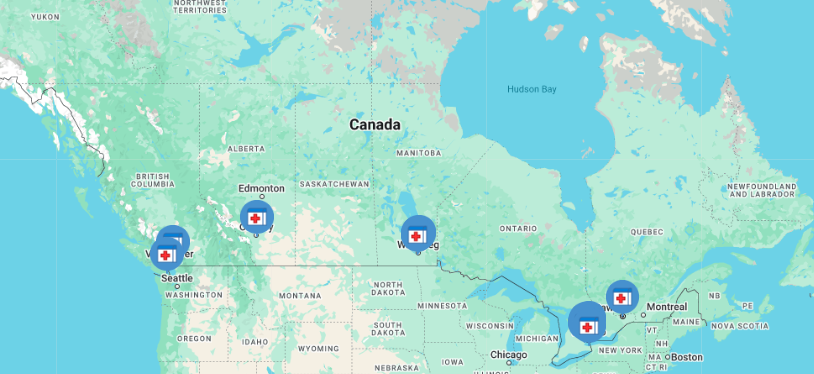GUIDED SLEEP PATHWAY
This 6-week one-on-one program is designed to help you understand the root causes of your sleep struggles and guide you toward long-lasting, restful sleep. Using evidence-based strategies like Cognitive Behavioural Therapy for Insomnia (CBT-I), mindfulness, and lifestyle coaching, you’ll develop a healthier relationship with sleep—without relying on medication.
You’ll also get access to a self-assessment and a curated library of sleep and mental health resources.
IMPROVE SLEEP QUALITY
MANAGE NIGHTTIME ANXIETY
REDUCE INSOMNIA
WAKE UP FEELING RESTED
About the Program
Fall asleep faster, stay asleep longer, wake up more refreshed, and reduce nighttime overthinking.
DETAILS:

UNDERSTANDING SLEEP + STRESS CONNECTIONS
Begin by exploring your current sleep habits, thoughts, and routines that might be interfering with rest. Your therapist will help you understand the psychological and lifestyle factors that contribute to poor sleep. Together, you’ll create sleep goals that align with your needs and daily rhythm.

EVIDENCE-BASED TOOLS FOR SLEEP
You’ll be introduced to tools from Cognitive Behavioural Therapy for Insomnia (CBT-I), as well as mindfulness, relaxation techniques, and sleep hygiene strategies. You’ll learn how to break patterns like rumination, sleep avoidance, or screen dependency before bed. We’ll also work on managing stress and anxiety that interferes with falling or staying asleep.

ROUTINE RESET & LONG-TERM SLEEP HEALTH
In the final phase, your therapist will help you fine-tune a sustainable evening routine and manage setbacks (like travel, stress, or shift changes). You’ll leave with personalized techniques for long-term sleep health, more energy, and better emotional regulation during the day.

UNDERSTANDING SLEEP + STRESS CONNECTIONS
Begin by exploring your current sleep habits, thoughts, and routines that might be interfering with rest. Your therapist will help you understand the psychological and lifestyle factors that contribute to poor sleep. Together, you’ll create sleep goals that align with your needs and daily rhythm.

EVIDENCE-BASED TOOLS FOR SLEEP
You’ll be introduced to tools from Cognitive Behavioural Therapy for Insomnia (CBT-I), as well as mindfulness, relaxation techniques, and sleep hygiene strategies. You’ll learn how to break patterns like rumination, sleep avoidance, or screen dependency before bed. We’ll also work on managing stress and anxiety that interferes with falling or staying asleep.

ROUTINE RESET & LONG-TERM SLEEP HEALTH
In the final phase, your therapist will help you fine-tune a sustainable evening routine and manage setbacks (like travel, stress, or shift changes). You’ll leave with personalized techniques for long-term sleep health, more energy, and better emotional regulation during the day.
Meet Your Therapist
Understanding and managing sleep disorders is crucial for maintaining overall well-being. The impact of sleep issues varies widely; they can cause symptoms like fatigue, irritability, difficulty concentrating, and anxiety. Long-term sleep disruptions can lead to more serious health problems, such as cardiovascular issues, weakened immune response, and mental health disorders like depression. Techniques like establishing a regular sleep routine, relaxation exercises, and seeking professional help can mitigate their effects and improve quality of life.
– Sagita

Sagita Zeqo, RP
Not sure where to start?
Try a self-assessment.
Our self-assessment is based on the Sleep Hygiene Index, a widely used and accepted tool for assessing an individuals quality of sleep. Use of the assessment is anonymous. Our online assessment includes guidance regarding scoring as well as suggested follow-up based on the outcome of the assessment.
Always keep in mind that there are a variety of factors that can influence the reliability of the assessment, that your individual scores may vary over time, and, above all, that it is an assessment rather than a diagnostic tool. As such, this and similar self-guided assessments are not substitutes for professional guidance and should never be considered definitive.
BETTER SLEEP RESOURCES
The following list of resources is provided solely for educational purposes. WELL Mental Health & Wellness is not affiliated with any third party content providers or sources.
Commonly Asked Questions
What are the common reasons people suffer from sleep disorders?
Common reasons people suffer from sleep disorders include stress, anxiety, depression, medical conditions, lifestyle factors, poor sleep hygiene, medications, and environmental disturbances. These factors disrupt normal sleep patterns and quality.
Can I improve my sleep on my own?
Yes, you can improve your sleep on your own by establishing a consistent sleep schedule, creating a relaxing bedtime routine, optimizing your sleep environment, reducing caffeine and screen time, and practicing relaxation techniques.
How can a therapist help me improve the quality of my sleep?
A therapist can help improve sleep quality by addressing underlying issues like stress, anxiety, or depression, teaching relaxation techniques, guide you in developing healthy sleep habits, and provide tailored strategies for overcoming insomnia or sleep disturbances.
Canada's largest network of therapists.
Our diverse network of qualified mental health professionals can support you with many mental health concerns. We believe that excellent client-therapist relationships are crucial for effective support, which is why you can choose your own therapist, and change therapists, at any time.

Supporting you, wherever you are.
As a part of the WELL Health Medical Centre team, we offer in-person therapy at select WELL Clinics. The majority of WELL Mental Health and Wellness services are covered by private insurance and corporate benefits plans.
Available at select WELL Clinics in British Columbia, Alberta, Ontario, and Manitoba.



